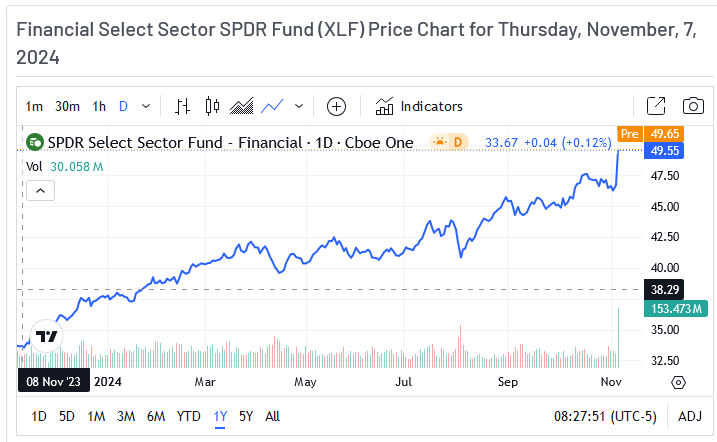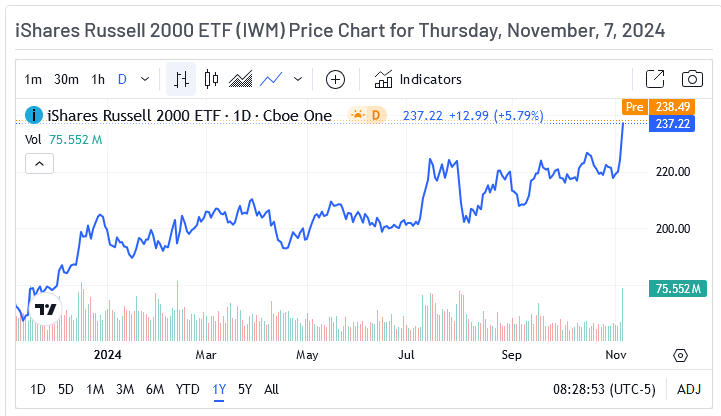Top 3 Sectors Outperforming After Trump’s Victory
2024.11.07 11:10
- The market surged to record highs following Trump’s 2024 election win.
- Energy sector, financial sector, and small-cap stocks jumped on Trump’s win.
- The energy sector jumped more than 4%, the financials climbed nearly 6%, and the small-cap-focused IWM ETF broke out of a multi-year consolidation.
Wall Street’s main indexes and several of the street’s individual favorites like Palantir (NYSE:) and NVIDIA (NASDAQ:) soared to record highs following Donald Trump’s victory in the 2024 U.S. presidential election, a dramatic return to power after his defeat in 2020. Investors responded with optimism to the prospect of a president known for pro-business policies, including tax cuts and deregulation, despite potential concerns around tariffs and rising deficits.
While stocks across the board saw gains, some sectors have broken out with remarkable momentum. The energy sector, financial sector, and popular small-cap-focused ETF lead the charge, all posting impressive moves and signaling potential opportunities for investors. Let’s explore why these sectors are surging and what investors should watch moving forward.
1. Energy Sector Strengthens as Global Supply Dynamics Shift
The Energy Select Sector SPDR® Fund (NYSE:) surged over 4%, breaking through a critical resistance level near $90 and pushing past several significant moving averages.
This breakout brought its year-to-date gains to roughly 12%, positioning the sector as one of the strongest performers in the post-election rally.
Why the surge? Trump has promised to revive aggressive domestic energy policies, including an unrestricted “drill, baby, drill” approach. With American petroleum production already at record highs, the market anticipates even higher output if regulations are further rolled back. Analysts at Goldman Sachs have also highlighted the potential for tighter sanctions on oil-exporting nations such as Venezuela and Iran, which could constrict global supply of and boost prices further.
For investors, the focus should be whether the XLE can turn its breakout point near $92, marking a critical 52-week resistance trendline, into a support level. Sustained consolidation above this area could signal an opportunity for entry with defined risk and potential for solid upside if Trump’s policy plans begin to take shape.
2. Financial Sector Surges as XLF Hits New All-Time Highs
The financial sector emerged as one of the most notable beneficiaries, with The Financial Select Sector SPDR® Fund (NYSE:) gaining close to 6% and breaking out to new all-time highs. Within this surge, JPMorgan stood out, climbing more than 11% to be one of the S&P 500’s top performers on Wednesday.

Trump’s pro-business stance is a natural boon for financials. His previous administration championed deregulation, easing compliance requirements and reducing bank operational costs. Additionally, renewed corporate tax cuts could encourage economic growth, leading to wider net interest margins that support higher bank profitability. These factors and investor enthusiasm around economic growth policies provide a natural tailwind for the sector.
However, it’s worth noting that the XLF’s relative strength index (RSI) has reached overbought levels around 73, indicating a potential cooling-off period might be due. Investors looking to take positions should consider waiting for a pullback or a period of consolidation that resets the RSI before jumping in, especially if they don’t already have exposure.
3. Small-Cap Stocks Breakout of Multi-Year Base
Rounding out the list are small-cap stocks, represented by the iShares Russell 2000 ETF (NYSE:), which jumped 5.6% and broke out of a multi-year consolidation zone near $228.
This breakout signals a significant shift in momentum for small-cap stocks, which could mark a turning point for a sector that has lagged in recent years.
Small-cap companies, often more focused on domestic operations and usually strapped for cash, are poised to benefit from Trump’s policies to stimulate U.S. economic growth. Tax cuts and deregulation could enhance profitability and cash flow for these smaller businesses, boosting investor confidence and driving capital flow into the sector. The breakout also aligns with a broader risk-on sentiment that reflects an increased appetite for equities amid pro-growth economic policies.
Investors should watch whether the IWM can hold above its breakout level and establish it as a firm support zone. This move could signal that the rally has more room to run, especially if economic policies fuel continued growth in domestic demand and business investment.
Original Post








